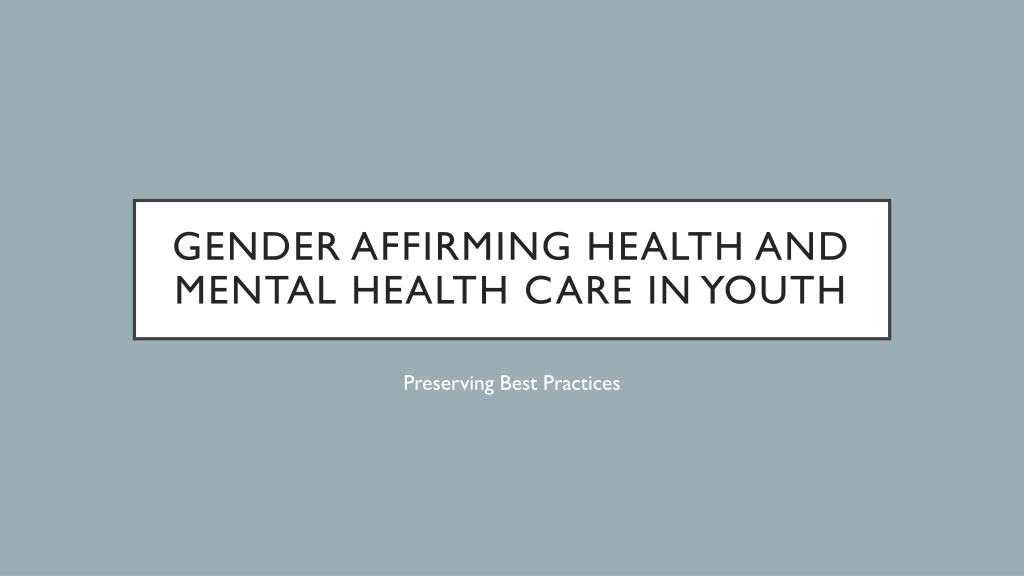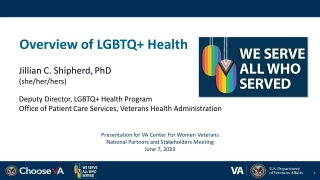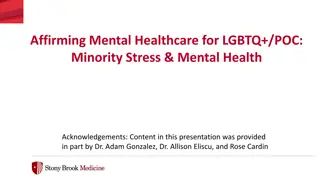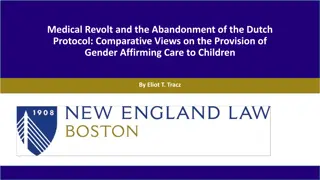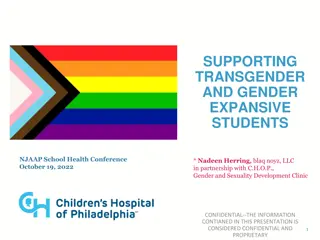Understanding Gender-Affirming Health and Mental Care in Youth
Gender-affirming health and mental care in youth focus on supporting individuals in transitioning to a gender aligning with their identity. It involves reducing gender dysphoria, following evidence-based practices, and respecting diverse gender expressions. Gender identity development is influenced by biology, culture, and social factors, emphasizing the importance of patient-centered, collaborative, and culturally sensitive care. Accessing gender-affirming care can be challenging due to various factors. It is crucial to understand what gender-affirming care entails, and also what it does not include, such as inappropriate treatments or surgeries without consent.
Download Presentation

Please find below an Image/Link to download the presentation.
The content on the website is provided AS IS for your information and personal use only. It may not be sold, licensed, or shared on other websites without obtaining consent from the author. Download presentation by click this link. If you encounter any issues during the download, it is possible that the publisher has removed the file from their server.
E N D
Presentation Transcript
GENDER AFFIRMING HEALTH AND MENTAL HEALTH CARE IN YOUTH Preserving Best Practices
PANEL INTRODUCTIONS
Health care that supports a person's desire to transition to a gender that aligns with their gender identity (social, hormonal, surgical) Health care that affirms a patient's gender identity through policies and procedures, regardless of what the pt is being seen for WHAT IS GENDER AFFIRMING HEALTH CARE? Care that reduces or alleviates gender dysphoria Patient centered and medically necessary Collaborative with the patient, their guardians, the medical team and in many cases the community mental health provider Evidence based Age appropriate Interdisciplinary approach Follows specific guidelines set by the Endocrine Society and WPATH
The premise of the gender affirming care model: No gender identity or expression is wrong. Gender presentations are diverse and vary across cultures. WHAT GENDER AFFIRMING CARE IS Gender identity development involves a combination of biology, development, socialization, culture, and context. Gender may be fluid and is not binary. Mental health conditions are more often caused by negative cultural reactions to gender diversity than by gender identity or expression itself.
PANEL What does gender affirming care mean to you? What do you consider gender affirming when it comes to medical care? How difficult is it to access gender affirming medical and mental health care?
Experimental (a basic PubMed search found 13, 399 studies dating back to the 1940's) WHAT GENDER AFFIRMING CARE IS NOT Initiated prior to onset of puberty in minors Causes people to become gender diverse Providing care that is inappropriate (given a patient's presentation, circumstances, medical and social history, goals of treatment, parent consent, patient consent, mental and emotional stability, lab work, co-morbid conditions etc..) Initiated without parent consent About "performing surgeries on children" A trend
What other misinformation or myths you have encountered about gender affirming care in children and adolescents? PANEL What else would you like to share about gender affirming care to this audience?
Do physicians and mental health professionals hesitate to treat other conditions with evidence- based practices? Medical necessity Consider the alternative- Wait we already have! (conversion "therapies") Research confirms that GAC leads to better health and mental health outcomes! (American Psychological Association, American Academy of Child and Adolescent Psychiatry, the Endocrine Society, American Medical Association, American Academy of Pediatrics, National Association of Social Workers call this care evidence based and medically necessary) High risk population requires informed and compassionate care:subst use, eating disorders,depression, anxiety, suicidal ideation, suicide attempt,self-harm behaviors... WHY GENDER AFFIRMING CARE?
WHY GENDER AFFIRMING CARE? Trevor Project 2023 US National Survey
What do you want those working in health care and public health to know about why gender affirming care is so important? If this care had not been available to you, what would the impact have been? PANEL
LANDSCAPE OF GENDER AFFIRMING CARE IN THE U.S. (updated 9/19/23) Map and data produced by Southern Equality Campaign, 2023
H808 prohibits the initiation of any gender-affirming care in NC for people under the age of 18, including puberty blockers, gender-affirming hormone therapy, and surgery. WHAT HB 808 DOES H808 prohibits state funds from being directly or indirectly used toward gender-affirming care for you H808 prohibits Medicaid from covering these services after August 1st 2023.
It does not restrict care for youth who have begun a course of treatment before August 1st, 2023. It does not prohibit gender-affirming care for anyone over the age of 18. WHAT H B 808 DOES NOT DO It does not prohibit the State Employees Health Plan from covering gender-affirming care. It does not prohibit minors from receiving gender-affirming care from outside of NC. It does not restrict affirming mental health care for transgender and nonbinary minors.
How are these laws impacting you, either directly or indirectly? PANEL What do you wish people understood about the impact of these laws on not just trans and non-binary youth, but the entire LGBTQ+ community?
Do no additional harm Show Up! WHAT CAN I DO? Pay attention Give your time and money
How can we help support gender affirming care for you and others? PANEL
CHEAT SHEET DO THIS NOT THAT Don't make assumptions about a person's gender and pronouns Avoid demeaning or "othering" language The terms transgender and non-binary are adjectives , not nouns. For example "he's a transgender" or "she is transgendered" or "I think that person is a non-binary" is not appropriate. Don't ask about gender affirmation surgeries Especially with youth,be mindful not to "out" someone inadvertently Once you know a person's pronouns- use them Create safe spaces in your spaces Get training and educate yourself (especially if you are in a health care profession) Speak up when misgendering or discrimination is observed If you're not sure how to address someone,just ask Treat all human beings with dignity, compassion and respect If you accidently misgender someone apologize and correct yourself
ACKNOWLEDGEMENT OF WHO IS NOT REPRESENTED HERE TODAY BIPOC who are transgender or non-binary were not intentionally excluded from the panel. Transmen or transmasculine individuals also were not intentionally excluded from the panel
Equality NC: https://equalitync.org/ Campaign for Southern Equality:https://southernequality.org/ GLSEN: https://glsen.org/ RESOURCES PFLAG:https://pflag.org/ Trevor Project:https://www.thetrevorproject.org/ It Gets Better Project:https://itgetsbetter.org/
